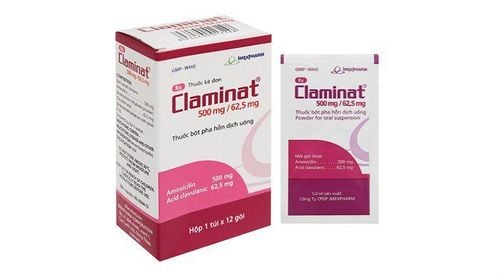This is an automatically translated article.
Apharova drug is made in the form of tablets, with the main ingredient being Spiramycin. The drug is indicated for use in the treatment of infections of the skin, respiratory tract, genitals,...
1. Uses of Apharova
Apharova medicine has the main ingredient is Spiramycin with a content of 1,500,000 IU. Apharova is a macrolide antibiotic for oral administration. The antibacterial effect of the drug comes from binding to the 50S ribosomal subunit, inhibiting bacterial protein biosynthesis. The component Spiramycin has good effects on gram-positive bacteria strains; It has no effect on gram-negative enteric bacteria.
Indications to use Apharova:
Treatment of infections in the respiratory tract, skin and genital organs; Prophylactic treatment of meningococcal meningitis (when the patient has a contraindication to rifampicin); Prophylaxis of congenital Toxoplasma infection during pregnancy; Chemoprophylaxis of recurrent acute rheumatic fever in patients allergic to penicillin. Contraindications to the use of Apharova:
People with hypersensitivity to Spiramycin, Erythromycin.
2. How to use and dose Apharova
Usage: Orally. Patients should take the drug at least 2 hours before meals or 3 hours after meals.
Dosage:
Usual dosage: Adults: Take 1-2 tablets/time x 3 times/day; Children: Take a dose of 150,000 IU/kg body weight/day, divided into 3 times; Dosage for prevention of meningitis caused by Meningococcus strains: Adults: Take 2 tablets every 12 hours; Children: Use a dose of 75,000 IU/kg body weight, every 12 hours for 5 days; Prophylaxis against congenital Toxoplasma infection during pregnancy: 9 million UI/day, divided into several times, taken within 3 weeks. Repeat dose every 2 weeks; Use in combination or alternately with the treatment regimen of Pyrimethamine/Sulfonamide will give better effect. *Note:
Food in the stomach will reduce the bioavailability of Spiramycin, so patients need to take the drug at least 2 hours before meals or take it 3 hours after meals; Patients using Spiramycin need to follow the entire course of treatment. Overdose: In case of emergency or overdose, the patient should call 911 or go to the nearest hospital for examination and treatment.
Missed dose: If you miss a dose of Apharova, the patient should take it as soon as possible. If it is almost time for the next dose, skip the missed dose and take the next dose at the scheduled time.
3. Side effects of the drug Apharova
Usually, Apharova rarely causes serious side effects. Some side effects that may be encountered when using the drug include:
Common: Nausea, vomiting, indigestion, diarrhea; Uncommon: Fatigue, sweating, epistaxis, chest tightness, acute colitis, skin rash, exanthema, urticaria; Rare: Anaphylactic reactions, superinfection due to long-term drug use. When experiencing side effects of Apharova, patients should immediately notify their doctor to receive appropriate advice and intervention.
4. Be careful when using Apharova
Some notes for patients to remember before and while using Apharova:
Be careful when using the drug in people with liver disease or liver failure (because the drug can be toxic to the liver); Use caution when using the drug in the elderly, children under 15 years old; Use caution when using the drug in people with myasthenia gravis, stomach ulcers, hepatic coma; Apharova is not excreted in the active form by the kidneys, so no dose adjustment is required in patients with renal impairment; Apharova crosses the placenta, but the concentration of the drug in the fetal blood is lower than in the mother's blood. Therefore, the drug does not cause complications when used for pregnant women, but users should still be careful, only using the drug when prescribed by a doctor; Apharova is excreted in breast milk in high concentrations, so breast-feeding should be discontinued if you are taking the drug.
5. Apharova drug interactions
Some drug interactions Apharova include:
Using Apharova concurrently with oral contraceptives will make birth control ineffective; Concomitant administration of Apharova with levodopa will inhibit the absorption of carbidopa, reducing levodopa concentrations. Therefore, clinical monitoring and dose adjustment of levodopa is required; Do not mix Spiramycin (an ingredient of Apharova) with other drugs in the same family. When using Apharova, patients should strictly follow the doctor's instructions on dosage and how to use the drug. This ensures the effectiveness of the drug and reduces the risk of unpredictable complications.
Follow Vinmec International General Hospital website to get more health, nutrition and beauty information to protect the health of yourself and your loved ones in your family.
Please dial HOTLINE for more information or register for an appointment HERE. Download MyVinmec app to make appointments faster and to manage your bookings easily.













